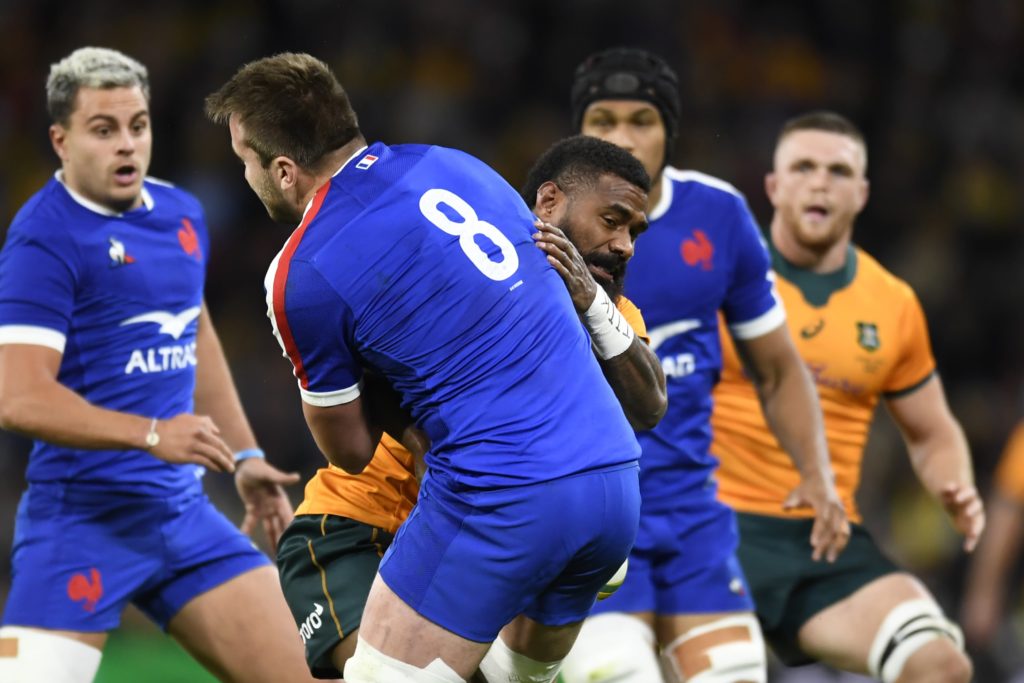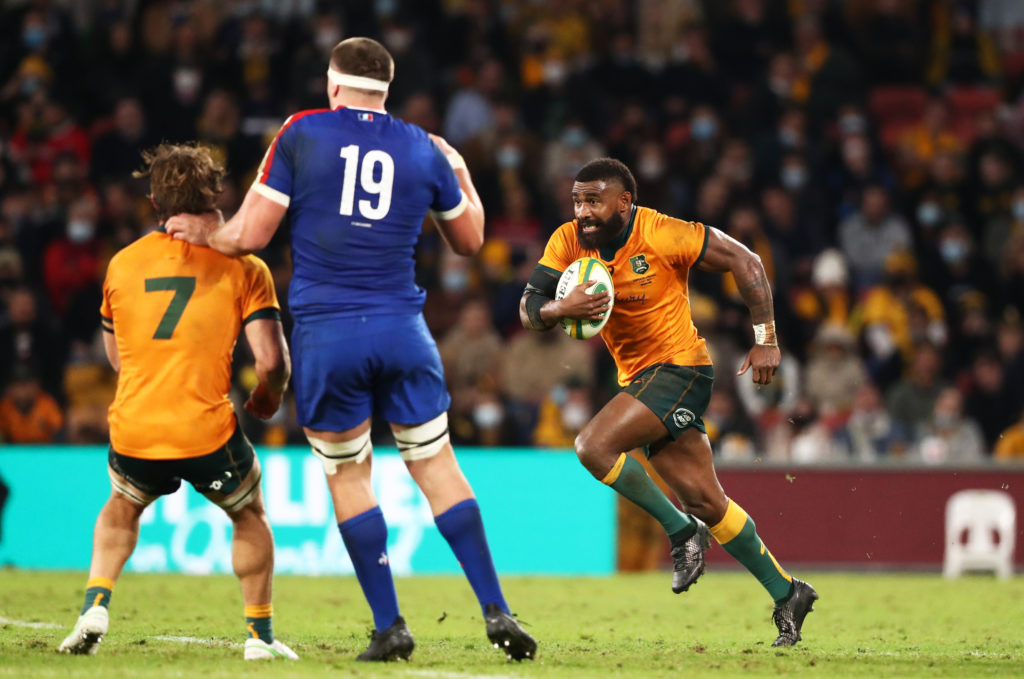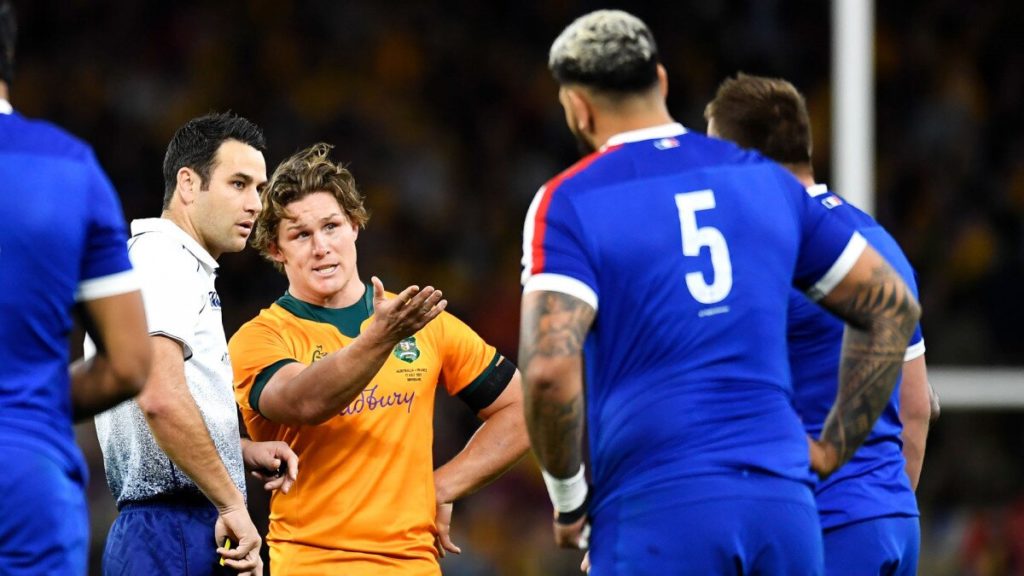It’s easy to see why so many were up in arms following Marika Koroibete’s sending off against France on Saturday.
In just the fifth minute of the series decider, Koroibete was handed a red card by New Zealand referee Ben O’Keeffe when the Wallabies winger clattered into French captain Anthony Jelonch from a kick-off, leaving the number 8 clutching at his forehead in apparent pain.
It was, by all accounts, a smashing tackle.
Koroibete came charging in from a distance and slammed his shoulder into Jelonch, dislodging the ball in the process and, on first appearances, handed the Wallabies prime attacking ball inside France’s 22.
Then the officials got involved.

The tackle, despite looking almost perfect on first viewing in real-time, had drifted well above the chest area and, at best, connected with Jelonch’s shoulder – but the images weren’t conclusive. There was a distinct possibility that Koroibete had connected with the French’s captain neck or possibly even head.
After almost four minutes of deliberation, O’Keeffe, assistants Brendon Pickerill and Mike Fraser, and TMO Glenn Newman reached a decision, sending Koroibete to the sidelines and forcing Australia to play with 14 men for the remainder of the match.
On Monday evening, Koroibete was cleared by the judiciary and had the red card struck from his record on the basis that the tackle had in fact connected initially with Jelonch’s shoulder before riding up and making ‘incidental’ contact with the neck.
The Wallabies escaped with a three-point win on Saturday, despite France’s one-man advantage, and Koroibete is now free to play against the All Blacks on August 7. All in all, the damage done was minimal – but the red card and subsequent overturning of the decision should be a warning to World Rugby but that when the law leaves so much down to interpretation, there could be massive ramifications.
Imagine, for example, if the Springboks or Lions are erroneously forced to play the deciding test of their upcoming series with 14 men, and suffer a narrow loss.
World Rugby have tried to make the law as clear as possible and, to their credit, the decision-making process is fairly straightforward.
Worse still, what if similar events unfold during the next Rugby World Cup?
World Rugby have tried to make the law as clear as possible and, to their credit, the decision-making process is fairly straightforward.
In assessing potential foul play with regards to the high tackle, four questions are asked:
- Has head contact (including to the neck and throat area) occurred?
- Was there foul play (i.e. was the contact intentional, reckless, or avoidable?)?
- What was the degree of danger?
- Is there any mitigation?
Mitigations can include anything from the defending player suddenly dropping their height to if the tackler’s vision is obstructed – but the list isn’t exhaustive, there’s still a grey area here that allows officials to make a judgement call.

As a side note, in Koroibete’s case there was no sudden, unexpected change in height of the ball-carrier, despite what some might suggest. Jelonch bracing for impact doesn’t fit the bill; a player slipping and falling to the ground is the type of ‘sudden’ drop that’s needed to really change a decision.
Regardless, while the questions themselves are all fairly uncomplicated, the issue with the Koroibete tackle on the weekend was that it wasn’t clear-cut whether any head contact had actually occurred.
Yes, Jelonch clutched his face and collapsed to the ground in a show that would have made even the most dramatic footballers blush, but even with the countless camera angles and frames on offer, it was difficult to determine where the point of contact was in the tackle.
Nobody could have honestly said with complete certainty that they knew exactly where Koroibete’s shoulder had connected with Jelonch, even with all the technology the game currently employs. For an official on the field, the problem is compounded further. O’Keeffe, Pickerill and Fraser only had access to the screens at the stadium – which provided the trio with a considerably lower quality picture than what the TMO and even fans at home had access to.
Ultimately, while Koroibete’s tackle would have been considered reckless and potentially dangerous, there was no definitive evidence that there’d been any direct contact to the head – making the final three questions of the process redundant.
So much of what happens in a game of rugby comes down to the referee’s interpretation. Over the course of a match, you expect the small decisions to even out, but a red card such as Koroibete’s can be game-changing
World Rugby’s latest TMO protocol guidelines suggest that any potential acts of foul play must be ‘clear and obvious’ for the TMO to make a call. Glenn Newman, in this case, probably should have instructed Ben O’Keeffe that there wasn’t enough evidence to dish out a red card to Koroibete.
The sending off could have changed the outcome of the game and the series and it should have World Rugby seriously re-considering their decision not to introduce 20-minute red cards on a global scale.
Super Rugby trialled the amended laws this year which allows for a red-carded player to be replaced after 20 minutes on the sidelines.
The balance was perhaps not quite perfect yet, however, and the temporary team punishment might need to be made more permanent for intentional acts of egregious foul play.
As it currently stands, a red card incurred in the fifth minute of a match is a significantly harsher punishment than one dished out in the final quarter, but the biggest problem remains that so much of what happens in a game of rugby comes down to the referee’s interpretation. Over the course of a match, you expect the small decisions to even out, but a red card such as Koroibete’s can be game-changing, which is a massive issue when it can be so difficult to truly determine what’s foul play and what’s not due to limits on technology.

Given the fine line, Jelonch’s unsportsmanlike milking of the incident could become encouraged in the future because it might just be enough to convince the referee or TMO to sway their decision one way or another.
“It was terribly milked wasn’t it,” Wallabies coach Dave Rennie said following the match.
“He obviously feels he got some head contact and then he’s grabbed his face, which is nowhere near the put of impact and then it’s delayed by five seconds.
“The issue for us is, do we get to the stage [where] we’re telling our players to lie on the ground like the French did every time there’s any head contact?
“I don’t think it’s in the spirit of the game.”
Rennie is absolutely correct – but it’s a problem that’s not going to go away, and it’s only further amplified by how big of an impact the ‘simulation’ can have on a game.
At the end of the day, Marika Koroibete should never have been handed a red card in the first place, given the foul play wasn’t ‘clear and obvious’, but that’s exactly why World Rugby needs to come up with a solution to foul play that doesn’t compromise a match entirely, especially when there’s such a large grey area to contend with.



Comments
Join free and tell us what you really think!
Sign up for free